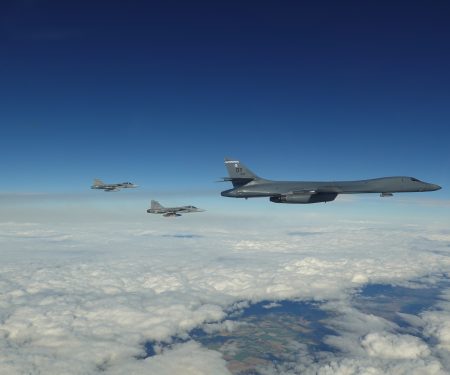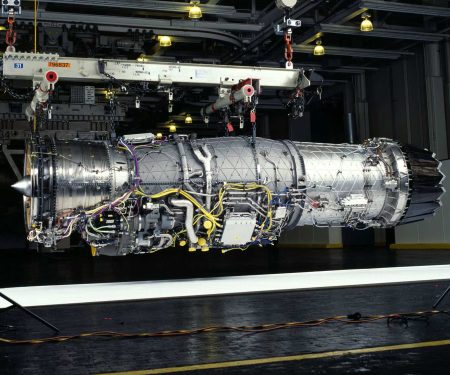Radar Sweep
Netanyahu Says the Gaza War Has Entered a New Stage and Will Be ‘Long and Difficult’
Israeli Prime Minister Benjamin Netanyahu told the nation Oct. 28 that the military has opened a “second stage” in the war against Hamas by sending ground forces into Gaza and expanding attacks from the ground, air, and sea. Casting the war as a fight for his country’s very survival, he warned that the assault would only intensify ahead of a broad ground invasion into the territory.
Do Troops Have Right to Unanimous Verdicts? Supreme Court Could Weigh In
An Airman is asking the Supreme Court to consider whether service members have the right to unanimous jury verdicts in general courts-martial, a right guaranteed to defendants in civilian criminal trials. The top military court, the Court of Appeals for the Armed Forces, decided in a 5-0 ruling in June that service members aren’t entitled to unanimous verdicts, confirming that a service member can be convicted and sentenced to prison time even if up to a quarter of the jury believes them to be not guilty.
Plans For More Destructive B61 Nuclear Bomb Unveiled
The Pentagon says it wants a higher-yield nuclear-gravity bomb based on the B61-12 design. The stated purpose of the B61-13 would be to offer more capability against especially hardened facilities, like underground strategic command and control centers, and larger area targets. The U.S. military announced its plans for the B61-13 on Oct. 27, noting that the start of the development of this weapon will be dependent on “Congressional authorization and appropriation.”
PODCAST: The Future of French Airpower
In Episode 152 of the Aerospace Advantage podcast, host John “Slick” Baum chats with Maj. Gen. Jean-Luc Moritz, head of the Future Combat Air System (FCAS) program for the French Air and Space Force. The FCAS is a next-generation fighter aircraft and the associated set of collaborative systems that France, Germany, and Spain are developing to replace types currently in service, like the Rafael, Typhoon, and Hornet.
After 3000.09 update, DOD Stays Quiet on Lethal Autonomous Weapon Reviews
Pentagon officials are operating under a seemingly de facto standard where they do not discuss when or what weapon systems have been, are, or will be subject to the freshly updated 3000.09 review process for examining and approving the deployment of lethal autonomous platforms that can engage military targets without troops intervening, DefenseScoop has learned. The first updated version of the Defense Department’s long-standing official policy—Directive 3000.09, “Autonomy in Weapon Systems”—went into effect in January.
L3Harris Points to Suppliers for Slowdown in Rocket-Motor Production
L3Harris Technologies says it's executing a plan to boost solid rocket motor production after acquiring Aerojet Rocketdyne and hopes to solve its main problem: getting sub-components from smaller companies on time. The Pentagon sees L3Harris as “the answer to the challenges and problems that they in the industry has had relative to rocket motors and we have their full support,” CEO Chris Kubasik said during the company’s third-quarter earnings call.
Turkey F-16 Sale Not a Done Deal, Even with Sweden’s NATO Bid on Track
Turkish President Recep Tayyip Erdogan sent the ratification protocols for Sweden’s NATO accession to parliament this week, but it’s unclear whether that’s enough to lock down the $20 billion sale for 40 new F-16s that Ankara seeks. That’s because the four key U.S. lawmakers who would need to greenlight the Block 70 F-16 fighter jets to Turkey are voicing concerns about other issues unrelated to Sweden’s NATO accession.
New Joint Force Space Doctrine Clarifies Space Command’s ‘Offensive’, ‘Defensive’ Ops
The latest revision to the doctrine guiding Joint Force operations in space, obtained by Breaking Defense, is a major overhaul—codifying U.S. Space Command’s (SPACECOM) scope of action as well as clarifying U.S. military space missions and how they are to be undertaken. This includes more clearly establishing the fact that SPACECOM and the other combatant commands will conduct “offensive and defensive space operations” during conflict, using “direct or enabling” capabilities against adversary space assets—that is, spacecraft on orbit, terrestrial control stations, and/or the data links between them.
Ground Stations as-a-Service Struggle to Gain Foothold in Military Market
Decades-old military ground stations that track and control satellites are projected to run out of capacity as more spacecraft are launched to orbit. Despite a capacity crunch, industry executives say the military is not taking advantage of ground stations that are now provided as a commercial service. Commercial services could help the Space Force deal with a shortage of capacity at satellite control centers but face an uphill battle for acceptance, executives said last week at the MilSat Symposium in Mountain View, Calif.
First Amendment Advocates Say Air Force Tweak to Public Records Request Process ‘Very Troubling’
A new change to the Air Force's Freedom of Information Act submission portal, asking whether individuals seeking public information from the service would agree to accept only “clearly releasable” information, is alarming First Amendment advocates and government watchdogs. Military.com discovered the change to the service's portal this month when submitting what's called a FOIA request for government documents that could be used for news reporting and are legally required to be made public upon request. A newly added question asks the filer to check “yes” or ‘no” and agree in advance to potential redactions of information before submitting their form online.
6 More Ghost Stories from the Most Haunted Place in the US Military
The island of Okinawa, Japan, is arguably the most haunted duty station U.S. military members can be sent to. The stories of spectral samurai, elderly harbingers of doom, and dead soldiers asking the living to light their cigarettes are well-documented—but previous lists are far from exhaustive.





